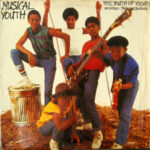 “But Anyway,” a standout track from Blues Traveler’s 1994 album Four, is one of the band’s most beloved songs, earning praise for its infectious melody, complex lyrics, and the band’s signature blend of rock, blues, and jam band influences. Written by lead vocalist and harmonica player John Popper, the song blends personal introspection with energetic musicality, which helped define the band’s sound in the 1990s.
“But Anyway,” a standout track from Blues Traveler’s 1994 album Four, is one of the band’s most beloved songs, earning praise for its infectious melody, complex lyrics, and the band’s signature blend of rock, blues, and jam band influences. Written by lead vocalist and harmonica player John Popper, the song blends personal introspection with energetic musicality, which helped define the band’s sound in the 1990s.
Released at the height of the ’90s alternative rock movement, Four solidified Blues Traveler’s place in the mainstream, with “But Anyway” serving as the album’s lead single. The song quickly became a fan favorite due to its reflective lyrics, improvisational jams, and Popper’s virtuosic harmonica playing. Over the years, “But Anyway” has come to represent the band’s ethos of musical exploration and their ability to seamlessly blend genre influences while staying true to their roots in blues and rock.
This article takes a deep dive into “But Anyway,” exploring the song’s lyrical themes, the creative process behind its creation, its place in the context of Blues Traveler’s career, and the legacy it continues to carry.
The Genesis of “But Anyway”
“But Anyway” was written by Blues Traveler’s frontman John Popper, who is known for his distinct blend of witty, sometimes cryptic, and introspective lyrics. Popper, a virtuoso harmonica player, formed Blues Traveler in 1987 in Princeton, New Jersey, with guitarist Chan Kinchla, bassist Bobby Sheehan, and drummer Brendan Hill. The band quickly became known for their eclectic mix of blues, rock, jam band sensibilities, and improvisational music.
The song was released as the lead single from Four, their fourth studio album, which marked the band’s commercial breakthrough. Prior to Four, Blues Traveler had enjoyed a strong fanbase within the jam band scene but had not yet achieved mainstream recognition. Their first few albums gained them a loyal following, particularly due to their live performances, which often included extended improvisational jams and deep, soulful renditions of their tracks. Four was different, as it brought a more polished, radio-friendly sound while maintaining the band’s energetic live performance roots.
Popper penned “But Anyway” during a particularly turbulent period in his life. According to interviews, the song reflects his emotional state, grappling with feelings of uncertainty and frustration. However, much like the rest of Four, “But Anyway” doesn’t dwell on the darkness of these emotions—instead, it offers a sense of catharsis and optimism in the face of adversity.
The Lyrics: A Journey Through Confusion and Resolution
The song opens with a distinctive harmonica intro, immediately establishing the tone for what is to come—an intense, powerful blend of rock and blues. The lyrics of “But Anyway” are steeped in the themes of self-reflection, existential questioning, and the complexity of navigating personal struggles.
“I can’t help it if I’m lucky”
One of the recurring motifs in the song is a sense of randomness or luck. This line is one of the first phrases in the song and immediately sets the stage for the emotional content that follows. The feeling of being carried along by fate or luck, rather than personal agency or control, becomes a key theme of the song. Popper is grappling with a sense of uncertainty, acknowledging that his life and his path may not always be a result of his own decisions but rather something larger than himself, something beyond his control.
“It’s so hard to keep it all straight / And I wonder how much of this I really need”
These lines echo Popper’s internal conflict. He questions his personal beliefs and decisions, suggesting an overarching confusion about life. There’s an existential questioning that pervades the song, questioning the importance of maintaining a certain path or identity, wondering if it’s all worth the effort. The “straight” in the line could represent a path or clear direction, which seems elusive or difficult to maintain.
“But anyway, I’m feelin’ fine”
Despite the inner turmoil conveyed in the verses, the chorus brings a sense of resolution: “But anyway, I’m feelin’ fine.” The repetition of this line in the song functions as a moment of release, where the confusion and questioning are momentarily suspended, and the protagonist embraces a sense of peace or acceptance. It reflects the sentiment that, no matter how chaotic or unclear life might seem, there is a certain power in letting go of that struggle and simply “feeling fine.” The refrain suggests the idea of moving forward with positivity and perseverance, despite life’s difficulties.
The recurring use of “but anyway” throughout the song also introduces a sense of deflection. It implies that, while the speaker may have things weighing on their mind, they are choosing not to dwell on those matters but to focus instead on how they are doing in the present moment. The phrase becomes a form of emotional shorthand, allowing the protagonist to avoid over-analysis and instead prioritize their emotional well-being.
The Power of Ambiguity
One of the key elements of “But Anyway” is its ambiguity. While it is clear that the song speaks to the inner emotional struggles of the songwriter, Popper leaves much open to interpretation. The lyrics themselves are open-ended, and rather than providing clear answers or resolutions, the song gives listeners the opportunity to project their own experiences and feelings onto it. This is one of the reasons why “But Anyway” resonates with so many different people—it isn’t a song that prescribes a specific solution or explanation but rather offers a cathartic experience of release.
Popper himself has said that the song was a form of therapy for him, and it’s evident that, through the process of writing and performing it, he was able to express and process his frustrations. The personal nature of the song makes it relatable to a wide range of listeners, as the struggles Popper addresses are universal in their nature.
The Musical Arrangement: A Blend of Blues, Rock, and Jam Band Influence
From a musical perspective, “But Anyway” is a classic example of Blues Traveler’s eclectic mix of genres. The song’s driving beat and rhythm are rooted in rock and blues, but it also incorporates elements of jazz, funk, and jam band sensibilities. Blues Traveler has often been compared to other jam bands like Phish or the Grateful Dead, whose music is characterized by extended instrumental jams and improvisation. “But Anyway,” while more radio-friendly than many of their other tracks, still carries the band’s improvisational spirit.
The song’s instrumental sections, particularly the guitar and harmonica solos, highlight the band’s prowess as musicians. The instrumental breaks are not just technical exercises—they serve the song’s emotional arc, building tension and releasing it in powerful crescendos. The harmonica, in particular, is a standout feature of the track. Popper’s virtuoso harmonica playing, with its intricate phrasing and emotive expressiveness, elevates the song, adding layers of emotion and depth to the already complex lyrical content.
Another key musical element in the track is the rhythm section, which provides a solid backbone for the song. The bassline and drum patterns drive the song forward, giving it an infectious energy that complements the lyrical themes of moving forward despite uncertainty. The tight, cohesive instrumentation and dynamic shifts create an engaging listening experience, keeping the listener engaged as the song progresses through its various emotional and musical stages.
Reception and Impact
Upon its release, “But Anyway” became an instant hit with fans and critics alike. The song’s catchy chorus and memorable melodies made it an easy track for radio stations to embrace, and its success marked a key moment in Blues Traveler’s career. “But Anyway” reached number 11 on the Billboard Modern Rock Tracks chart and became one of the band’s most successful songs on mainstream radio.
The success of “But Anyway” was pivotal for Blues Traveler, as it helped them transition from being a primarily cult-followed jam band to a more mainstream act. Four was their breakthrough album, and the song played a large part in that success, exposing the band to a much wider audience. Blues Traveler had been known for their live performances, which were legendary for their improvisational nature and energetic jams, but “But Anyway” was a song that appealed to both long-time fans and casual listeners, showing the band’s ability to craft a radio-friendly single without sacrificing their core identity.
Over the years, “But Anyway” has continued to resonate with fans, becoming one of the band’s most beloved tracks. It has been featured in numerous live performances, often extended into jam sessions, and remains a staple of the band’s setlists. The song’s ability to remain relevant and connect with audiences long after its initial release is a testament to its enduring power.
Legacy of “But Anyway”
“But Anyway” has remained one of Blues Traveler’s signature songs, symbolizing the band’s mix of heartfelt songwriting and technical musical ability. The track showcases their ability to craft songs that are both introspective and accessible, with a melody that lingers long after the song ends.
More than just a popular song, “But Anyway” represents the heart of Blues Traveler’s approach to music: the merging of personal experiences with collective expression. The band’s ability to balance emotional depth with energetic musicianship allows them to create songs that connect with listeners on multiple levels. Through “But Anyway,” Blues Traveler not only created an anthem for their time but also carved out a space in rock and blues history, influencing countless musicians and fans alike.
As a song that continues to hold emotional weight and captivate listeners with its layers of meaning, “But Anyway” will likely remain a classic for years to come. Whether as a reflection of John Popper’s own journey or as a universal expression of human vulnerability and resilience, it stands as one of the defining tracks of Blues Traveler’s career and a true testament to the power of music.
This post has already been read 112 times!









